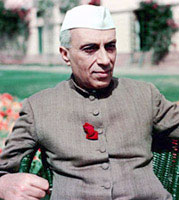Pandit Jawaharlal Nehru, the first Prime Minister of independent
India was born at Allahabad on 14 November 1889. He was
the only son of Motilal Nehru and Swarup Rani. From the
age of 15 to 23 Jawaharlal studied in England at Harrow,
Cambridge and the Inner Temple returning to India in 1912.
Even though he had a brilliant academic record, the legal
profession did not attract him. Instead, he wanted to join
the freedom struggle under the influence of Gandhiji. For
a while he was the Chairman of the Allahabad Municipal Committee
as a member of the Congress and then he joined the Home
Rule League established by Bal Gangadhar Tilak and Annie
Besant.

During the freedom struggle, he courted arrest many a times,
and had been jailed 14 years in all. He was elected Congress
President 5 times, and it was under his influence in Lahore,
that the Congress adopted complete freedom as its goal.
In 1947, after India gained its independence, he was automatically
elected first Prime Minister.
Jawaharlal Nehru remained the Prime Minister of India for
17 long years and can rightly be called the architect of
modern India. He set India on the path of democracy and
nurtured its institution - Parliament, multi-party system,
independent judiciary and free press. He encouraged Panjayati
Raj institutions.
With the foresight of a statesman he created institutions
like Planning Commission, National Science Laboratories
and laid the foundation of a vast public sector for developing
infrastructure for industrial growth. Besides, developing
the public sector, Nehru also wanted to encourage the private
sector to establish a social order based on social justice
he emphasised the need of planned development. Nehru gave
a clear direction to India’s role in the comity of nations
with the policy of non alignment and the principle of Panchsheel,
the five principles of peaceful coexistence at a time when
the rivalries of cold-war were driving the humanity to its
doom. His vision was that of extensive application of science
and technology and industrialisation for better living and
liberation from the clutches of poverty, superstition and
ignorance. Education to him was very important for internal
freedom and fearlessness. It was Nehru who insisted if the
world was to exist at all; it must exist as one. He was
generous and gracious. Emotional sensitivity and intellectual
passion infused his writings, giving them unusual appeal
and topicality even today. He was awarded Bharat Ratna in
1955. He never forgot India's great cultural heritage and
liked to combine tradition with modernity.
Jawaharlal was a prolific writer in English and wrote a
number of books like ‘The Discovery of India’, ‘Glimpses
of World History’, his autobiography, ‘towards Freedom'
(1936) ran nine editions in the first year alone. Emotional
sensitivity and intellectual passion infused his writings,
giving them unusual appeal & topicality even today. He was
awarded Bharat Ratna in 1955.
Nehru as a Personality
Not only was he a brilliant orator, a charming, warm and
noble thinker and philosopher, but also a fantastic writer.
He has written a few wonderful books 'Discovery of India',
'Glimpses of World History' and ' Letters from a father
to a daughter''.
On May 27, 1964, India lost a great influence. In the words
of Dr. Radhakrishnan "As a fighter for freedom he was illustrious
as a maker of a modern India, his services were unparalleled.
His life and works have had a profound influence on our
mental make-up, social structure and intellectual development.
|